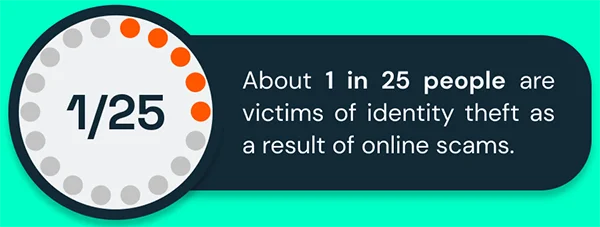
Hey, it’s 2024 and the internet is used by almost everyone on the planet.
From your neighbor’s bratty kid to your uncle living in the boonies, everyone is using the internet these days.
But that’s not all, the internet has become so integral to our daily lives that it’s easy to forget that it is not a safe place.
While it is a great place to learn, shop, and connect with people, it is also home to the shadowy world of crime too.
People fall victim to online scams all the time, and with AI and other innovations becoming more accessible, it’s getting even better.
Be it a simple bait-and-switch to complex fraudulent schemes promising high returns on investments, you can easily fall victim to a ton of scams online.
But what happens when the people who are committing these scams get caught?
Do you get your money back? Will these people face judgment? Or will there be more scams?
Well, in this article, we will take a look at online scams and discuss what happens when someone is caught scamming online.
A Closer Look at Online Scams
With the internet becoming more and more accessible to all parts of the world, the number of online scams has just grown.
DID YOU KNOW?
Approximately more than 1.3 million people fall victim to online scams every day.
By taking advantage of the anonymity of the internet, these scams come in many different shapes and forms.
From phishing attempts to steal the personal information of victims to fake online stores that disappear right after they get paid for an order.
These scammers come up with the most creative ways to trick their victims.
And, while the creativity of these scammers might seem limitless, the authorities are coming up with their own new ways to find and bring these people to justice too.
The Consequences of Scamming Online
So, when you see these people get caught, the punishment is quick and harsh.
You know, when scammers get caught, they are usually charged with wire fraud.
This is a catch-all phrase for any scheme that electronically deprives another of the intangible right of honest services, as the US criminal code writes it.
Decoding Wire Fraud
Online scams are one of the biggest issues in the online world today.
It is usually categorized as a wire fraud crime as the nature of the crime is online and it is investigated by federal agencies like the FBI and the Secret Service.
So, for scammers to get convicted of this crime, the prosecutors need to prove that these people knowingly participated in a fraudulent scheme, and then used electronic communications in furtherance of the fraud.
The Path to Justice
We all know that online scams are pretty hard to detect and an investigation can only start after an official complaint has been raised by the victim.
This and a search warrant are needed for the authorities to start looking into the scam.
The process can be pretty long, as most times these scammers might be using shell companies to run these scams and most times they are often doing it from outside countries.
It is an intricate task to piece together what happened in a scam, so there are often many separate threads that might be traced through the company books to find not only the guilty party but also who they were in contact with.
Facing the Music: Penalties for Wire Fraud
The penalties for vomiting wire fraud are harsh and depend on the seriousness of the offense.
Scamsters usually face anywhere between a couple of years and up to 20 years of jail time.
In some cases, the sentences have far exceeded this, which highlights the grave view the law takes on such crimes.
In simpler terms, the jail time scammers get depends on the severity and impact of the crime, as well as how much money is involved.
In many of these cases, even parole has been denied.
The importance of early inmate release in this context lies in the potential for rehabilitation and the reduction of overcrowding in prisons, which can benefit both the individual and society.
Early release can offer a second chance for offenders to reintegrate into society, potentially leading to better long-term outcomes by providing opportunities for employment, education, and positive community involvement.
Navigating the Legal Maze
If you’ve been accused of participating in an online scam, you need to start looking for good legal counsel fast.
A seasoned attorney can easily navigate the complex legalese and make sure that your rights are protected, as well as offer you the best defense possible.
The Psychological Impact of Online Scams
Aside from the legal repercussions, the psychological toll it takes on an individual’s mindset cannot be underestimated.
The stigma, stress, and potential for personal and professional reputation damage further compound the challenges faced by those involved in these fraudulent activities.
The Ripple Effect of Online Scams
You know, it’s not just the immediate victims that get hurt because of these scams.
These cons put into question the safety of people in an online world and legitimate businesses and consumers are affected the most.
Each scam that goes unnoticed only gives a boost to the fraudster’s ego.
This creates a vicious cycle that’s hard to break.
Strengthening Defenses: Prevention and Awareness
As scams become a common thing, we need to make more people aware of them.
Knowing how to detect an online scam and avoid it is a skill that people desperately need in this online world.
Holding awareness campaigns and educational programs plays a key role in equipping internet users with the knowledge to recognize and avoid scams.
Simple strategies, like verifying the authenticity of websites, being skeptical of “too good to be true” offers, and using secure payment methods, can greatly reduce the risk of falling prey to scams.
The Role of Technology in Fighting Scams
Hey, the tech is getting pretty good these days.
With the help of machine-learning algorithms, artificial intelligence can easily detect patterns of fraud and report such activities.
This can be augmented with cooperation between technology companies, financial services, and law enforcement to strengthen it even more.
Collaborative Efforts in Tackling Online Scams
Scams are not just limited to one place, they happen everywhere in the world.
Countries need to work together and share their data and expertise to track and catch these scammers.
For example, we can hold seminars on online shopping scams to watch out for or how to detect scams and avoid them.
Aside from all these, we also need supportive communities that can help people be more aware of the online scams going around.
Empowering Through Digital Literacy
Digital literacy is not just about knowing how to use technology but also understanding the risks associated with the digital world.
We need to teach the public, especially those who are vulnerable like the old and young people about what online scams are and how to avoid them.
This knowledge allows these people to make informed decisions and navigate the internet safely.

In Conclusion
Online scams are a major issue that plagues internet users worldwide.
Just as there are so many different types of scams going around, authorities need to come up with different ways to catch these scamsters.
The consequences of getting caught committing scams are very harsh for scammers.
You also need to understand that scams not only impacts the victims but the people around them too.
We need to make a collaborative effort to overcome and catch scammers before they have the chance to do much damage.
Online communities can help educate people on the news about scams and how they can avoid them.
Being vigilant is the key to creating a safer online space throughout the internet.






